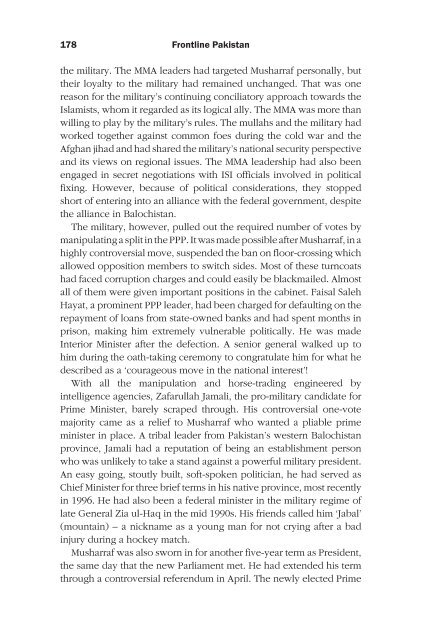Frontline Pakistan : The Struggle With Militant Islam - Arz-e-Pak
Frontline Pakistan : The Struggle With Militant Islam - Arz-e-Pak
Frontline Pakistan : The Struggle With Militant Islam - Arz-e-Pak
You also want an ePaper? Increase the reach of your titles
YUMPU automatically turns print PDFs into web optimized ePapers that Google loves.
1 <strong>Frontline</strong> <strong><strong>Pak</strong>istan</strong><br />
the military. <strong>The</strong> MMA leaders had targeted Musharraf personally, but<br />
their loyalty to the military had remained unchanged. That was one<br />
reason for the military’s continuing conciliatory approach towards the<br />
<strong>Islam</strong>ists, whom it regarded as its logical ally. <strong>The</strong> MMA was more than<br />
willing to play by the military’s rules. <strong>The</strong> mullahs and the military had<br />
worked together against common foes during the cold war and the<br />
Afghan jihad and had shared the military’s national security perspective<br />
and its views on regional issues. <strong>The</strong> MMA leadership had also been<br />
engaged in secret negotiations with ISI officials involved in political<br />
fixing. However, because of political considerations, they stopped<br />
short of entering into an alliance with the federal government, despite<br />
the alliance in Balochistan.<br />
<strong>The</strong> military, however, pulled out the required number of votes by<br />
manipulating a split in the PPP. It was made possible after Musharraf, in a<br />
highly controversial move, suspended the ban on floor-crossing which<br />
allowed opposition members to switch sides. Most of these turncoats<br />
had faced corruption charges and could easily be blackmailed. Almost<br />
all of them were given important positions in the cabinet. Faisal Saleh<br />
Hayat, a prominent PPP leader, had been charged for defaulting on the<br />
repayment of loans from state-owned banks and had spent months in<br />
prison, making him extremely vulnerable politically. He was made<br />
Interior Minister after the defection. A senior general walked up to<br />
him during the oath-taking ceremony to congratulate him for what he<br />
described as a ‘courageous move in the national interest’!<br />
<strong>With</strong> all the manipulation and horse-trading engineered by<br />
intelligence agencies, Zafarullah Jamali, the pro-military candidate for<br />
Prime Minister, barely scraped through. His controversial one-vote<br />
majority came as a relief to Musharraf who wanted a pliable prime<br />
minister in place. A tribal leader from <strong><strong>Pak</strong>istan</strong>’s western Balochistan<br />
province, Jamali had a reputation of being an establishment person<br />
who was unlikely to take a stand against a powerful military president.<br />
An easy going, stoutly built, soft-spoken politician, he had served as<br />
Chief Minister for three brief terms in his native province, most recently<br />
in 1996. He had also been a federal minister in the military regime of<br />
late General Zia ul-Haq in the mid 1990s. His friends called him ‘Jabal’<br />
(mountain) – a nickname as a young man for not crying after a bad<br />
injury during a hockey match.<br />
Musharraf was also sworn in for another five-year term as President,<br />
the same day that the new Parliament met. He had extended his term<br />
through a controversial referendum in April. <strong>The</strong> newly elected Prime













